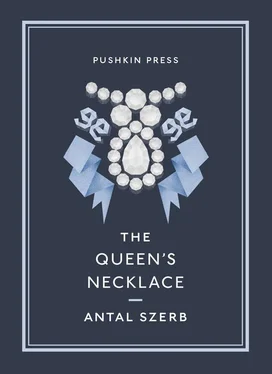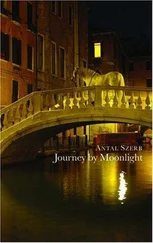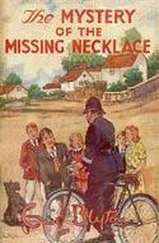Each of the actors in our story was waiting for that sort of miracle: Boehmer, that his wonderful bauble would, by some miraculous means, come to encircle some suitably miraculous imperial neck, and that the owner of that neck would pay him 1,600,000 livres with miraculous promptitude. Jeanne de la Motte looked for a miracle to restore her to her ancestral Valois status, and the longer she waited, the less it was likely to happen. Rohan waited for a miracle that would secure the Queen’s favour (and indeed favours), and the length of that wait kept him moping about in his fantastical rooms at Saverne. For Cagliostro, who was to enjoy the profits of everyone else’s hopes, miracles were his bread and butter. Marie-Antoinette meanwhile drifted from pleasure to pleasure while she waited for the true womanly miracle that would make all pleasure-seeking superfluous, and Louis XVI longed for a miracle-working finance minister who would make the deficit disappear, without the need to grind even more revenue out of the people, or curtail his household expenditure.
And the whole of France was waiting for the greatest miracle of all, the happiness of the people. They knew that a new age was at hand; they earnestly believed that the planned reforms would soon come to fruition. They rather imagined that some celestial monarch, surrounded by his courtiers, would descend between stage clouds while the angels Gluck and Grétry sounded an entrance on their silver-tongued trumpets; the King would raise his sceptre, and everyone in France would be happy. Not in their most fevered dreams did they imagine that, far from descending from above, the new age would burst forth from the underworld, from the Quartier St Antoine, with a Frisian cap on its head. The Lord punished his people’s blindness by granting them their wish. A few more years, and the miracle would indeed happen.
After this premonition of tragedy, let us return to the man who represents the burlesque element in our story, the alchemist’s Figaro.
In London, Cagliostro not only penetrated the secrets of the Freemasons, he also became involved in a highly complicated lawsuit which turned on a necklace — a foretaste of greater things to come. His defence was that his accusers, from whom he had swindled the necklace, had harassed him, constantly forcing presents on him to get him to name his price for allowing himself to be drawn into the whole shady business. But we must pass quickly over our friend’s picaresque adventures, however much they reflect the style of the period (the eighteenth century was the heyday of such adventurers and their escapades), apart from noting that he bamboozled his way with great success across the states of Eastern Europe, via The Hague, Leipzig, Mittau (the capital of the then independent Duchy of Courland), St Petersburg and Warsaw. Anyone who had known Cagliostro and his wife a few years earlier, as pilgrims in Spain or as a starveling couple haunting the inner-city districts of Paris and London, would not have recognised the mysterious Count and Countess they had become.
What a splendid sight it must have been, when the great adventurer arrived in a foreign city, outriders trotting before his four-horse carriage, with footmen clinging to the sides; taking rooms in the most elegant hostelry in town, and promptly inviting his new acquaintances to dinner. In no time at all a little sect would have formed around him, a secret circle of initiates. Among those flocking to his door would be the merely curious and those attracted by his wife’s beauty, but the greater part were there for the sage, the prophet, and the great magus.
Cagliostro was now travelling the world as the splendidly aristocratic and splendidly mysterious envoy of the Freemasonry lodges — a man on a cosmic-diplomatic mission. From the enigmatic shadows of his casual utterances one seemed to gather that he had been sent to Europe by Grand Masters dwelling in the depths of the pyramids, to inaugurate the Order’s most ancient and uniquely blessed ceremony, the ‘Egyptian Rite’. Its highest functionary was none other than the Great Kophta (“What, Your Excellency, you have never heard of the Great Kophta?!”), heir to the secret knowledge of the Prophet Elijah (almost certainly the Prophet Elijah) … and the Great Kophta must, surely, have been one and the same as this Count Cagliostro? These were truly great mysteries, not previously revealed to man, but patience was needed. The time for all these things was at hand, its hour was nigh — you had only to read the scriptures.
Meanwhile the Count was busy healing the sick — with varying results, just like the ‘real’ doctors, but with a few remarkable successes. He restored the once-unwrinkled faces of elderly ladies, and returned gentlemen of a certain age to their former youthful virility. He saw into the future. At his command spirits appeared in pitchers filled with water. The medium who actually saw these apparitions would be a young boy or a simple virgin, but it was Cagliostro who interpreted them. And he had vast amounts of money. Its source remains a secret to this day.
And so he arrived in Strasbourg.
If we struggle to believe that Cagliostro was the appointed saviour of mankind, but rather suspect that he was driven by somewhat more selfish and less honourable motives — as, sadly, we must conjecture — then we should consider his conduct in Strasbourg his truest work of art, the masterpiece of the genre.
He arrived on 19th September 1780, preceded by his fame as a miraculous healer. A huge crowd lined the banks of the Rhine to await his coming. Everyone had their own interesting story about him. He made his entrance in a carriage drawn by six horses, and his wife’s modest, virginal smile enchanted everyone. He wore his hair curled into little bunches; his blue taffeta robe was braided with pure gold and silver and glittered with jewels, both real and false. In his sheer elegance there was something slightly bizarre, a touch too flashy and not quite right, as was the case with his even greater compatriot Casanova. At the side of his hat he sported a tall white feather, an honest detail, since only quack doctors and market criers wore them at the time. For Cagliostro was certainly not the kind of charlatan who mesmerises his worshippers by his aristocratic appearance, his impeccably fine taste in costume and manners. He had no need for that sort of display. He had all the weapons at his command to retain the loyalty of the immediate associates by whom he was really judged. He could remain a mountebank, an organ-grinder, a monkey-tamer, and yet the great and the small prostrated themselves at his feet. A true triumph of the mind.
Nor did he live above his station. In Strasbourg his arrangements were decidedly simple and austere. He took lodgings first with a woman who sold tobacco, then with a canon’s wife. The common people adored him, and he in turn treated everyone with the same unvarying courtesy.
In Strasbourg, as in the cities of Eastern Europe, he founded another Egyptian lodge. But here, for the first time, he provided evidence of the sort of good deeds expected of a Freemason. He gave two hundred livres to a poor Italian to get him out of debtors’ prison, and followed it up with a full set of clothing when the man was released. He spent whole days visiting the sick, often staying late into the night. He treated the poor of the city without charge, and likewise the rich, who gradually came to seek him out in ever increasing numbers. They tried to press gratuities on him, but he would take nothing. This charlatan was generous, it seemed, to the point of naivety. It took a long time for him to realise that his assistant was diverting large sums into his own pocket, but when he did, he threw him out, and there was a very ugly lawsuit between the two of them.
Читать дальше












